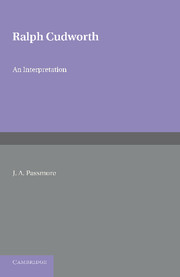Book contents
- Frontmatter
- Contents
- Preface
- Abbreviations
- CHAPTER I Cudworth and his Predecessors
- CHAPTER II Cudworth on Mind and Nature
- CHAPTER III Cudworth's Theory of Knowledge
- CHAPTER IV ‘Eternal and Immutable Morality’
- CHAPTER V Cudworth's Moral Psychology
- CHAPTER VI The Good Life
- CHAPTER VII Ethics and Religion
- CHAPTER VIII Cudworth and the British Moralists
- Appendix: The Cudworth Manuscripts
- A Cudworth Bibliography
- Index of Names
CHAPTER I - Cudworth and his Predecessors
Published online by Cambridge University Press: 05 June 2016
- Frontmatter
- Contents
- Preface
- Abbreviations
- CHAPTER I Cudworth and his Predecessors
- CHAPTER II Cudworth on Mind and Nature
- CHAPTER III Cudworth's Theory of Knowledge
- CHAPTER IV ‘Eternal and Immutable Morality’
- CHAPTER V Cudworth's Moral Psychology
- CHAPTER VI The Good Life
- CHAPTER VII Ethics and Religion
- CHAPTER VIII Cudworth and the British Moralists
- Appendix: The Cudworth Manuscripts
- A Cudworth Bibliography
- Index of Names
Summary
Cudworth is a Cambridge Platonist; that phrase has pinned him, decisively, in the historian's display-case. The facts are indisputable. He lived at Cambridge, except for a brief interval, from 1630, when he entered Emmanuel as a pensioner, until 1688, when he died, as Master of Christ's College. He was a Platonist, although his Platonism was that of the Renaissance, innocent of modern scholarship. And it is not merely convenient but, from certain points of view, essential to think of him as a member of a school: the religious outlook which colours all his writings, with its emphasis on moral goodness and its distrust of all mechanical rules, was the common faith of all who fell under the influence of Benjamin Whichcote.
Does it follow, as is so often assumed, that Cudworth's philosophy is of interest only to antiquarians, not at all to philosophers, or even to the historian of modern ideas? So sympathetic an interpreter as F. J. Powicke will not put the importance of Cudworth's writings more strongly than this: ‘a rich quarry to which an occasional student has been indebted for apt quotations and curious references’. Perhaps he had in mind Berkeley's ‘learned Dr Cudworth’ perhaps Locke's praise of The True Intellectual System as a book ‘wherein that very learned author, hath with such accurateness and judgment, collected and explained the opinions of the Greek philosophers’ in any case, there is evidence to spare that Cudworth's writings were an important repository of classical learning.
But that is not the whole story. Cudworth, wrote Pierre Bayle, ‘avait joint ensemble deux qualites qui ne vont guere de compagnie. Il avait une lecture prodigieuse et un pénétration d'esprit extraordinaire.’ This combination of qualities had already, when Cudworth wrote, passed out of fashion; and now that the ‘prodigious reading’ has come to seem prodigiously uncritical—looking at it as we do from the vantage-point of several centuries of scholarship—it is tempting to underrate Cudworth's ‘pénétration d'esprit’ and to minimize the extent of his influence. That influence we shall later describe in some detail, but one general problem has to be faced at the outset. Was his influence that of a reactionary?
- Type
- Chapter
- Information
- Ralph Cudworth , pp. 1 - 18Publisher: Cambridge University PressPrint publication year: 2013

